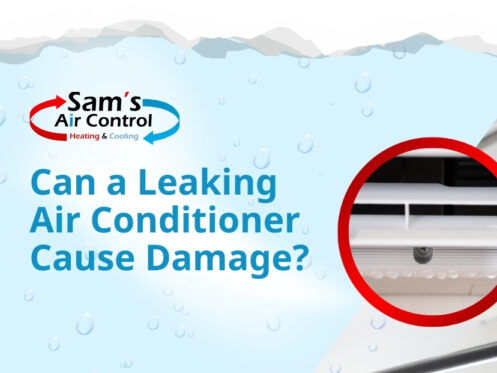After spending a warm day at one of the many beautiful parks in Edison, NJ, the last thing you want to return home to is a leaking air conditioner. An air conditioner leaking water may be a sign of a much more significant problem hiding behind the scenes.
Fortunately, the professionals at Sam’s Air Control Heating and Cooling offer expert AC maintenance and repair services to help you address this issue. Here’s what you need to know if you have an air conditioner that’s dripping or leaking water.
What Causes an Air Conditioner to Drip or Leak Water?
Several problems could cause water to drip or leak from your air conditioner. Here are some of the most common reasons why you may see water leaking from your air conditioner.
Clogged condensate drain line
A clogged condensate drain line is one of the most common causes of a leaking air conditioner. This line is responsible for taking condensation and moving it away (or draining it) from the system and your home. However, dirt, mold, or other forms of debris can clog this line and cause water to eventually back up and start leaking. It may also lead to the drain pan overflowing and leaking if the blockage goes unnoticed.
Drain pan issues
The drain pan collects the condensation that comes from your condensate line and evaporator coil. If this component is cracked, rusted, or damaged, it can no longer hold water and will eventually start to leak. A constant stream of moisture and acid from condensation may also cause the drain pan to become damaged and worn out over time.
Frozen evaporator coils
A blocked or dirty air filter restricts airflow and may cause the evaporator coils to freeze. This is another common reason for an air conditioner to drip water. As the frozen coils start to thaw, the water starts to overflow in the drain pan and create a leak.
Refrigerant issues
If your system doesn’t have enough refrigerant, it can lead to freezing evaporator coils and leaks. A low refrigerant level restricts your air conditioner’s ability to cool your home effectively and can cause certain components to freeze. This freezing eventually leads to water accumulating and leaking over time.
Broken condenser
The heat released from your AC condenser could end up getting stuck, and this trapped condensation may cause a leak if the condenser is broken. Whether it’s a dent, hole, or crack, any form of damage to the condenser may cause a serious refrigerant leak. Decreased airflow could be related to condenser issues, so it’s best to call the experts at Sam’s Air Control for a professional inspection and condenser repair or replacement.
Signs You Have a Water Leak in Your AC System
Some water dripping from your AC unit is normal. The air conditioner cools and dehumidifies the air, and the excess moisture condensates and drips from the evaporator coils. However, if your air conditioner’s indoor unit is leaking water excessively, it’s usually an indication of a more serious problem.
The following signs indicate a water leak in your AC system:
- Pooling or dripping water: Consistent pooling or dripping water from your AC unit is a clear sign that you have a leak.
- Strange noises: Unusual hissing or bubbling sounds could mean that you have a refrigerant leak, which eventually causes a water leak.
- High energy bills: Leaks can cause your system to work harder and less efficiently, leading to rising cooling costs.
- Short cycling: Issues with your system short-cycling or taking longer than normal to cool your home may indicate a leak.
- Ice: Ice on the refrigerant lines or evaporator coils is a common indicator of a leak.
- Disconnected drain line: When the drain line is disconnected, it may cause water to leak into your home.
How a Leaking AC Can Damage Your Home
If your AC is leaking, turn it off and contact us right away. Don’t attempt to make repairs yourself because it could make the problem worse. A leaking AC can cause significant damage to your home, especially if the issue persists and isn’t addressed as quickly as possible.
Water damage to the structure
Water leaks of any kind may cause significant damage to your home and the structure as a whole. As the water sits and spreads, it seeps into your home’s insulation, drywall, or the floor, creating a major mess.
AC water leaks can cause serious damage that could cost you thousands of dollars to repair. Depending on the severity and the location of the leak, it may even damage your home’s foundation.
Mold and mildew
Excess moisture, including moisture from AC leaks, can promote the growth of mold or mildew inside your home. Not only does this create unpleasant odors, but mildew and mold spores also pose a serious risk to your health. The longer an AC leak goes ignored, the greater the chances are that mold and mildew will form.
System damage
A leaking air conditioner can cause damage to the system itself. Leaks make your air conditioner operate less efficiently and may lead to complete system failure. This reduced efficiency also leads to higher energy bills.
An air conditioner leak also poses an electrical hazard. Water that comes into contact with electrical components may cause short circuits and potentially dangerous electrical fires.
What To Do if Your Air Conditioner Is Dripping Water Inside
Follow these steps if your air conditioner is dripping water inside your home:
- Step one: Turn the air conditioner off to prevent further water damage and to help you investigate the issue safely.
- Step two: Use a shop vac, mop, or towels to clean up leaking water, and clean up leaks near the evaporator coil if the source of the leak is due to a frozen coil.
- Step three: Check and clean or replace your air filter. A clogged filter restricts airflow and may cause the evaporator coils to freeze and cause a water leak.
- Step four: Remove the air conditioner’s main access panel, then inspect and clean the condensate drain line using a wet/dry vac or pipe cleaners to remove clogs and buildup.
- Step five: Inspect your drain pan to look for rust, cracks, or damage, and replace it if necessary.
- Step six: Check the float switch if your drain pan is full of water. A malfunctioning float switch may prevent the AC from shutting off when the drain pan is full.
- Step seven: Replace or add insulation around your AC unit to prevent ice from forming on the evaporator coil.
- Step eight: Contact the professionals at Sam’s Air Control if you can’t locate the source of the leak, can’t stop the leak, or need an expert to inspect, diagnose, and repair the issue.
Contact Sam’s Air Control for AC Water Leaks
A leaking air conditioner can cause serious damage to your health and home, and AC leaks should never be ignored. The team at Sam’s Air Control Heating and Cooling proudly serves our customers in Edison and the surrounding areas to help you address AC leaks and more. Contact us today to schedule reliable AC leak repair in Edison and surrounding areas.


